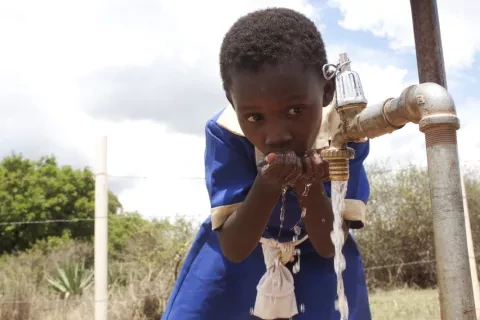
GOVERNMENT and its development partners have come to the rescue of the girl child at Vhudzi Primary School in Zaka district, Masvingo province, by providing essential resources to help them manage their menstrual cycles without having to miss classes.
The introduction of new Water, Sanitation, and Hygiene (WASH) facilities, complete with private toilets and bathing areas, has provided girls at the school with the much- needed moral boost to maintain their hygiene in a dignified manner.
The programme was introduced by the Ministry of Primary and Secondary Education in collaboration with UNICEF, funding from KwF Development Bank of Germany.
The partnership has resulted in the installation of clean water facilities, toilets, and hand washing stations, helping to curb the spread of diseases like cholera
Zaka district development coordinator Victor Zinanga told NewsDay that the Wash programme has benefitted seven schools in the district.
“With the coming in of Unicef and the government to intervene, Wash projects in schools specifically in Zaka have seen seven schools benefiting,” Zinanga said.
“Schools have had toilet extensions with the girl child’s welfare in school and the disability friendly toilets models being implemented in the new latrines that were built by our donors.
“The model has been embraced by the district as a whole and has been beneficial to everyone as we embrace the mantra of our President (Emmerson Mnangagwa) of not leaving anyone and no place behind.”
- Mavhunga puts DeMbare into Chibuku quarterfinals
- DeMbare fire blanks in drab draw
- Invictus to finally start drilling
- Dave Chappelle: US comedian attacked on stage in Los Angeles
Keep Reading
The new WASH facilities have not only provided access to clean water but have also led to a decrease in absenteeism among girls during their menstrual periods.
This comes at a time when the world is celebrating the International Day of the African Child on October 11 each year.Vhudzi Primary School head Peter Hwezha said the initiative came at a time absenteeism had greatly affected the education of young girls during their menstrual cycles in the past.
“Last year UNICEF assisted in building more toilets at the school and handwashing facilities and this has helped in curbing cholera and absenteeism as girls who are on their menstrual periods can now access water to bath and sanitary pads to change,” he said.
Health coordinator for the Fight Cholera Club at the school, Emma Magombeze called on stakeholders to support the installation of a solar system to pump water to the school, reducing the need for students to fetch water manually.
“The children fetch water manually to fill up the tank so that children can wash their hands, those who cook lunch can cook, girls on their periods can bathe and for our income generating projects like piggery and the chicken projects.
“So travelling more than 800 metres makes the children tired, some girls prefer staying home when they are on their menstrual periods, so we end up with the issue of absenteeism.
“We are calling on relevant stakeholders to assist with solar for piped water systems which will not be burdensome on anyone,” she said.
Yasha Mutiro, a Grade Six learner and treasurer of the Fight Cholera Club, highlighted the need for a closer water source and more menstrual pads to support girls during their periods.
She said: "Before, many girls would miss school during their periods due to lack of access to water and sanitary products.”The introduction of WASH services in Zaka district comes at a critical time as Zimbabwe continues to grapple with challenges related to water scarcity and sanitation.
The initiative aligns with the global focus on the rights and well-being of girls, particularly in marginalized communities.Last week, UNICEF appealed for US$34 million in financing for the water, sanitation, and hygiene (WASH) sector in order to strengthen community resilience in Zimbabwe against climate change.









